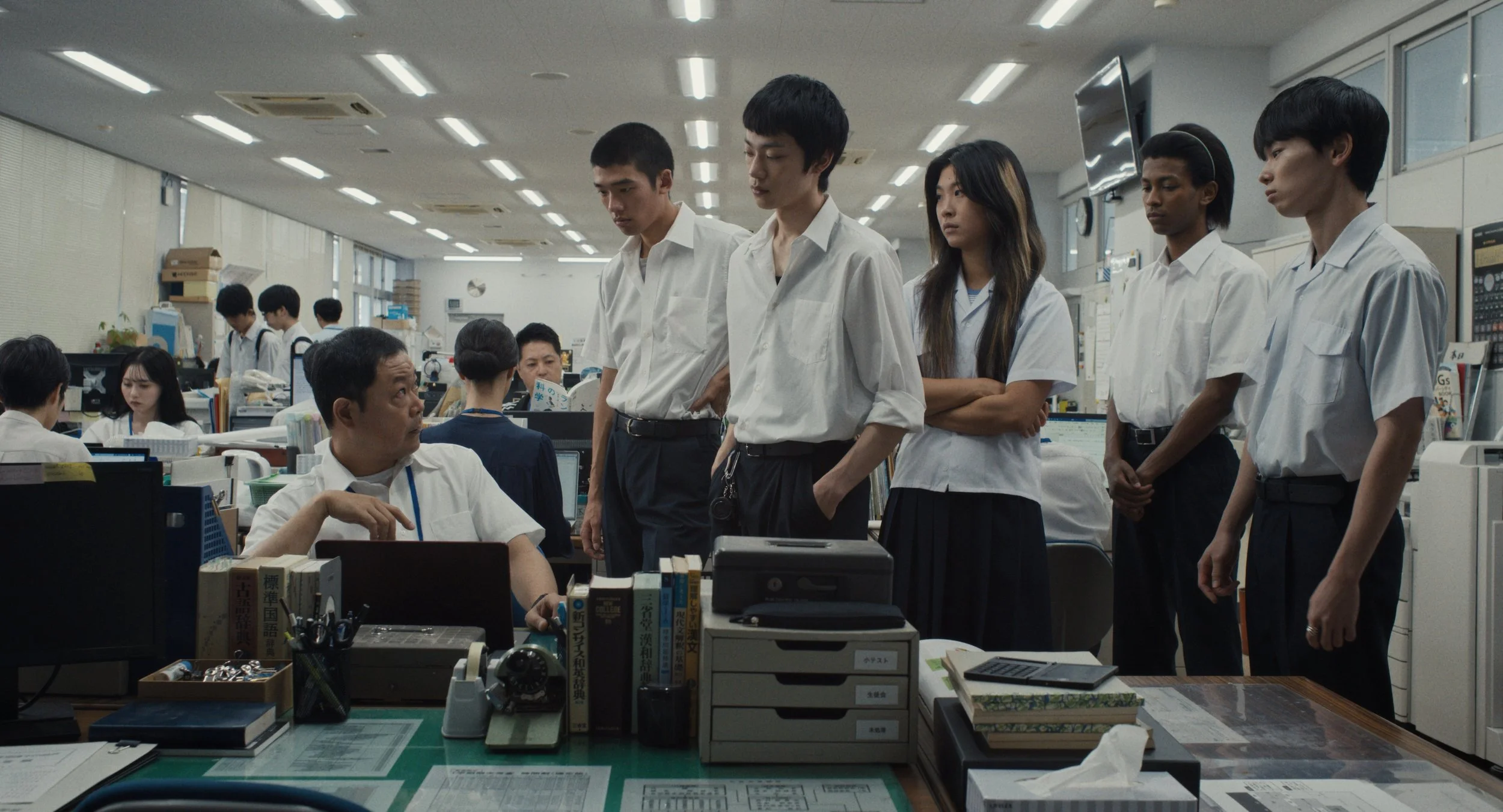Happyend and Politics of Japanese Youth
by Santiago Campodónico
Few movies in recent memory have had a cast of characters as memorable, diverse and complex as Neo Sora’s feature debut, Happyend. Set in a near-future Japan, the film follows a cast of techno-music loving students that, after going too far with a prank on the principal, see their school implement an AI surveillance system. This change, consequently, ends up revealing the characters’ true colours and complexities. Here, we’re not just referring to the main cast, as other students, teachers and even parents are forced out of their comfort zone by the school’s environment. New relationships begin to form, old ones start cracking, and all of it unfolds in a tense, engaging human story. But beyond this, what sets the film apart is how the framing of these characters is representative of real political postures found in Japanese youth.
Indeed, director Neo Sora doesn’t shy away from the fact that the school in Happyend is meant to be a microcosm of Japanese society. His true purpose is to use the setting to move from the particular to the general, providing a realistic snapshot of Japanese youth in service of a compelling story. This is further supported by the fact the film alludes to the politics of this near future Japan, which resemble the rise of xenophobia and racism that many western countries are currently experiencing. People in the film discuss, protest or comply with this fact, but it isn’t until the implementation of the AI system that the youth is finally prompted to take a stand. So, what do they choose? Why did they choose it?
Neo Sora's Vision and Why Happyend Matters
Before we dive into the film's characters and what they say about the politics of Japanese youth, it is important to introduce director Neo Sora. Son of Oscar-winning composer Ryuichi Sakamoto, Neo Sora was born in 1991 and was raised in both Tokyo and New York, with his education (professional and political) being informed by his experiences in these places. Because of this, Neo Sora has a unique and valuable perspective to add to the subject of Japanese politics. He is both an insider and an outsider, able to understand the culture he’s talking about, while also addressing the potential dangers it might be heading towards.
In fact, Neo Sora’s Happyend is addressing a potential danger to Japanese society, one that is currently creeping its way into mainstream acceptance. We’re referring to the resurgence of ultranationalism, which has become more prevalent in the 2020s in Japan, with parties like Sanseitō gaining increasing support. The film shows one such party being at office, but crucially, they aren’t an all-encompassing force. The future Happyend envisions is not an authoritative dystopia, rather, is the first step into becoming one. People’s rights are not taken away, they’re dismissed, and the genius of the film is how people, even friends of those affected, see it as natural. This all ties back to Neo Sora’s experiences; according to an interview he did with Sakura Central, the sentimental core of the film is how he lost friendships over political divides.
Ultimately, the character's political position is informed by their race, ethnicity, gender, etc. That is to say, Happyend is a film about identity politics. This is all the more crucial when we’re talking about young people, who are just starting to figure out who they are.
Identity Politics as understood by Happyend
Happyend takes a complex stance on identity politics, and understanding it can help us grasp its characters' grounded positions. Essentially, Neo Sora’s film leans towards the idea that “all politics are identity politics,” or, perhaps more accurately described, that “it always comes back to identity politics.” This isn’t to say that all political acts are explicitly about race, gender, or religion; rather, it argues that identity is always a fundamental and inseparable part of political thought and action.
Under this framework, identity is the foundation of political views, with one’s position in a social hierarchy consciously and unconsciously influencing their actions and inactions. Of course, one could argue that their political beliefs are not based on identity, but rather facts or empathy. Nevertheless, this position would argue that even in those cases identity should be considered. This is because political movements can seek to co-opt an identity and make it inseparable from their rhetoric. Consequently, a divergence from their political sentiment can be seen as a betrayal of one's own identity. An individual, for not complying, can be stripped from it, and the best shield against this tactic is a conscious awareness of its existence.
With that idea in mind, let's examine the two protagonists of Happyend to see what they tell us about the politics of Japanese youth.
Kou
The character we primarily follow, Kou, is someone whose development directly hinges on his political awakening. Son to a Zainichi Korean mom, it is explicitly stated throughout the film that Kou is not considered a full Japanese citizen, despite the fact he has lived there his whole life. Additionally, his father isn’t even present in his life, which makes the exclusion he suffers all the more baffling. As Kou soon discovers, being raised Japanese in almost every way, the creativity he shows in making techno, and his brilliant academic performance, is not enough to erase his lineage. Even as an exemplary case, he is seen as an outsider. So, what choice do those worse off have?
These struggles lead him to seek solutions, and one is presented when he meets Fumi, a young activist in his school that always seems to say what he wants to hear. With her, Kou starts attending protests and discussing politics, which eventually puts him at odds with friends and family. On the one hand, he sees his friend, and especially co-protagonist Yuta, as too childish to realize what he's fighting for. With his family, on the other hand, Kou struggles with his mom’s complacency with the system. Her goal was for Kou to be naturalized, and she sees his activism as jeopardizing that future.
Through this complex net of motivations and relationships, Kou ends up being a fantastic portrayal of the politics of second generation immigrants in contemporary Japan. These are young people who, like Kou, have found their parents’ complacency as ceding power to their oppressor. Being naturalized is ultimately seen as accepting a binary. And where there’s a binary, there’s a hierarchy. Their stance, therefore, is that this worldview should be opposed; otherwise, nothing would change. Accepting this, however, means risking the possibility of individuals escaping the oppression. If they’re to accomplish anything, everyone must remain united. Through Kou, we’re able to understand the scope and turmoil such a struggle entails.
Yuta
Kou’s best friend, Yuta is a wealthy Japanese-born student that loves techno-music, DJ equipment, and hanging out with his friends. The film is keen on presenting Yuta as someone who hasn’t changed much since childhood, which is why Kou grows increasingly furious at his naivety. However, as the film progresses, we come to understand that this childishness is a conscious decision. Yuta is not ignorant of the world around him, his partying and perceived innocence are, in themselves, politically motivated statements. Case in point, the techno-music he deeply loves, which historically was a tool for political resistance and community-making. For Yuta, joy is an act of defiance.
But there is one major flaw in Yuta’s worldview, one that the film is keen on highlighting: his privilege. By not recognizing his own position, Yuta is unable to comprehend why his friends can’t just follow his examples. This is brilliantly shown in a conversation he has with Kou in the streets. Here, Yuta lays down his perspective, and just when Kou seems convinced, he is taken away by the police as Yuta is left standing, frozen. The message is clear then: this political position, although valid, is not enough in the face of oppression. By the end of the film, Yuta is forced to reckon with that truth.
Overall, Yuta is probably the most representative character of Japanese youth politics there is in Happyend, in the sense he doesn’t fully understand politics. Don’t get us wrong, the Japanese youth knows there’s something wrong with the rise of ultranationalism, but their participation in preventing it is personal. It’s consuming music, partying at the right venues, creating safe places. It does not involve directly fighting oppression, since that would require a risk to their privilege. Of course, there’s people that cross that threshold, and others that don’t. Yuta ends up being a representation of the decision itself, the ugly implications of it, and the difficult journey of facing its consequences.
LAST WORDS
Happyend is a film whose characters are complex in more ways than we could enumerate in this article. Nevertheless, we hope that with this quick view of the protagonists you’ve gained a richer understanding of what Happyend is going for.
As stated previously, Sora’s intention was to go from the particular to the general, which goes beyond the school and even Japan. It's not hard to extrapolate what the film shows with the current resurgence of ultranationalism in the Western world. The future Sora envisions may be uncomfortably close. This is why now, more than ever, we need to be conscious of our identity, what it allows us to see, and what it blinds us to. For the sake of public safety, but also, for the wellbeing of our personal space. It always comes back to identity politics, and if we fail to understand that, we may lose friendships without knowing why. Ultimately, it’s our choice: to accept the near future or be prepared to resist it.
Santiago Campodonico is a writer, literature expert, and film critic from Perú. He specializes in Japanese Media, writing articles that span diverse mediums such as cinema, dance, history, art, music and books. As the chief film and culture writer for Japan Nakama, a leading online magazine dedicated to Japanese travel and lifestyle—he continues to share insights and reviews. Read more of his writing at Japan Nakama.









